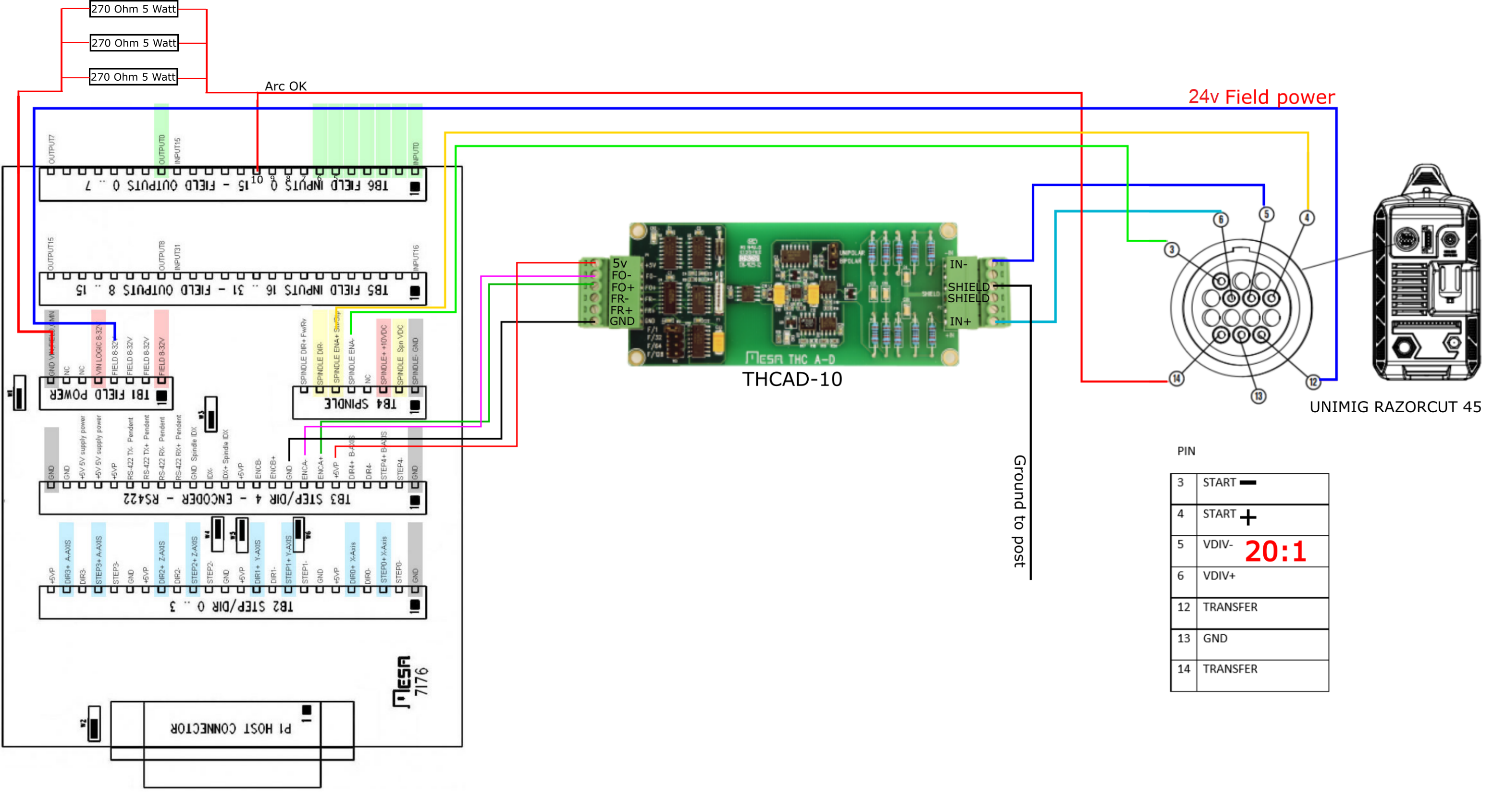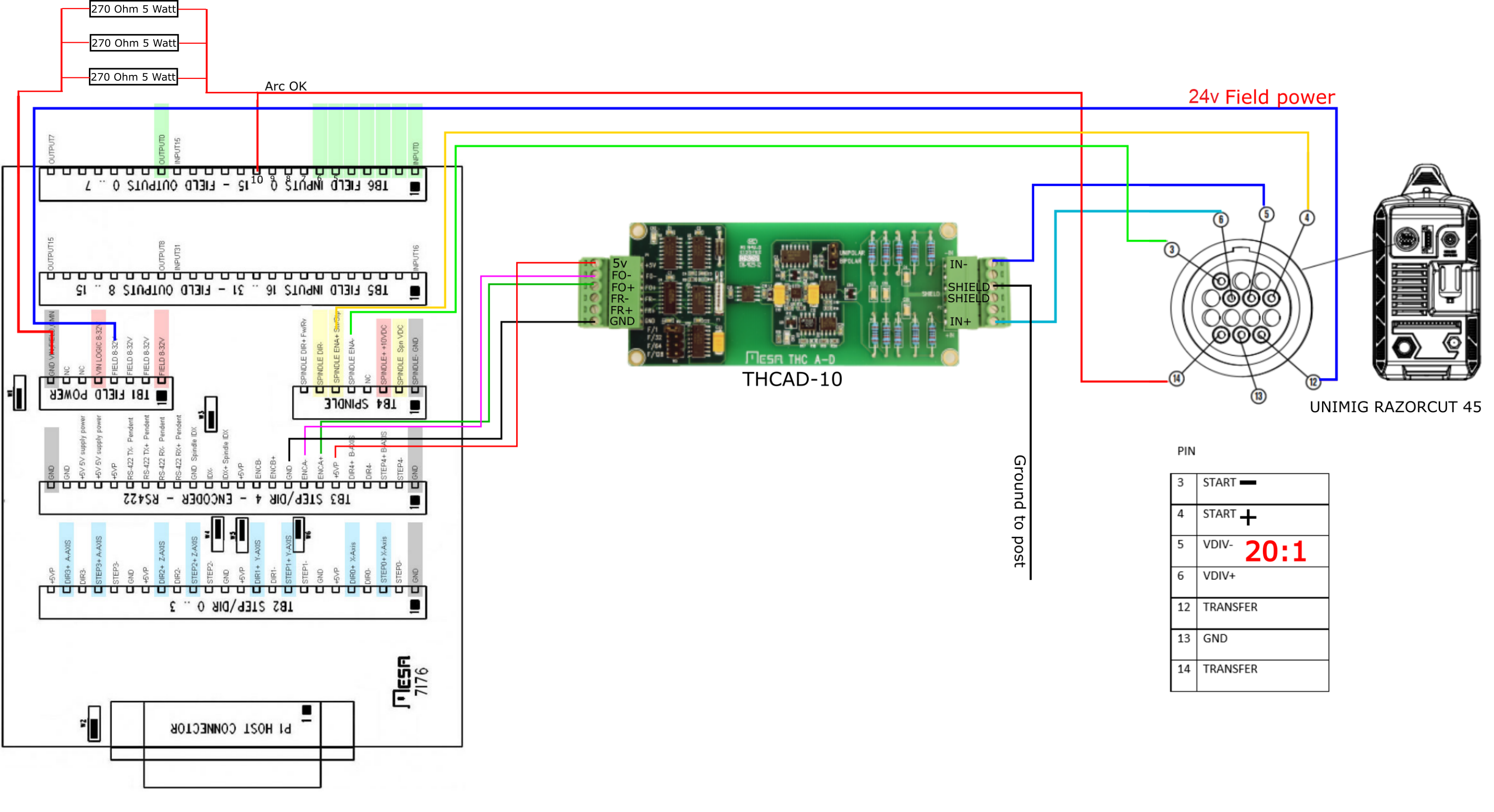Arc OK intermitent issues on torch fire
- phillc54
-

- Offline
- Platinum Member
-

- Posts: 5711
- Thank you received: 2093
The Hypertherm one I saw was 100mA @ 5V which is 0.5W. This equates to 21mA @ 24V.24 mA is well below the min current rating of most internal Arcok relays of 100 mA (certainly hypertherm, Everlast and Thermal Dynamics).
Please Log in or Create an account to join the conversation.
- rodw
-

- Offline
- Platinum Member
-

- Posts: 11545
- Thank you received: 3871
The Hypertherm one I saw was 100mA @ 5V which is 0.5W. This equates to 21mA @ 24V.24 mA is well below the min current rating of most internal Arcok relays of 100 mA (certainly hypertherm, Everlast and Thermal Dynamics).
I read that too but on checking this out with some research and conferring with my go to electronics expert, that not how it works with relays. The Hypertherm relay is also rated to 10 amps max so you need to be well within the minimum current. Regardless of the voltage passing through the circuit, you must respect the current ratings! eg. In this case, >100 mA at 24 volts (or whatever you are using).
We've had this discussion before and those who chose to take the advice I offered above fixed their problem.
Please Log in or Create an account to join the conversation.
- rodw
-

- Offline
- Platinum Member
-

- Posts: 11545
- Thank you received: 3871
Please Log in or Create an account to join the conversation.
- phillc54
-

- Offline
- Platinum Member
-

- Posts: 5711
- Thank you received: 2093
The manufacturer of the relay in the Hypertherm quotes:I read that too but on checking this out with some research and conferring with my go to electronics expert, that not how it works with relays. The Hypertherm relay is also rated to 10 amps max so you need to be well within the minimum current. Regardless of the voltage passing through the circuit, you must respect the current ratings! eg. In this case, >100 mA at 24 volts (or whatever you are using).
Min. recommended contact load 100mA at 5VDCPlease Log in or Create an account to join the conversation.
- rodw
-

- Offline
- Platinum Member
-

- Posts: 11545
- Thank you received: 3871
Its OK for you to theorise becasue you don't have an ArcOK relay in your plasma cutter and you have not experienced the frustration of intermittent ArcOK failure.
There is an easy fix proven in the real world that I have outlined that is backed by Ohms Law.
There is quite a tradeoff between the current draw and heat dissipation from the pull down resistor so we went for 200 to 300 mA to stay under 10 W.
Please Log in or Create an account to join the conversation.
- phillc54
-

- Offline
- Platinum Member
-

- Posts: 5711
- Thank you received: 2093
No, me either, it is a waste of my time. I am sure that reputable manufacturers allow a tolerance in their specs.I'm not going to argue the point but why would you design an analog circuit that is at the absolute minimum specifications? That is asking for trouble.
Its OK for you to theorise becasue you don't have an ArcOK relay in your plasma cutter and you have not experienced the frustration of intermittent ArcOK failure.
There is an easy fix proven in the real world that I have outlined that is backed by Ohms Law.
There is quite a tradeoff between the current draw and heat dissipation from the pull down resistor so we went for 200 to 300 mA to stay under 10 W.
I am well aware of Ohms Law, I have been using it regularly since 1971 when I began my career as a comminications technician with the then PMG.
Please Log in or Create an account to join the conversation.
- luftlupus
-
 Topic Author
Topic Author
- Offline
- Premium Member
-

- Posts: 84
- Thank you received: 16
That will give you around 24mA which would "probably" be adequate.
24 mA is well below the min current rating of most internal Arcok relays of 100 mA (certainly hypertherm, Everlast and Thermal Dynamics).
You need to add a pulldown resistor of around 90Ω 10W assuming a 24 volt ArcOK circuit and a Mesa card. Connect it from the Mesa input to -24 volt.
To achieve this from readily available parts we recommend to:
Get 3 x 270Ω 5W Resistors (Jaycar PN RR3284) and wire them in parallel. This will give 90Ω with 267mA and 6.4W of dissipation. 3 x 5W resistors in parallel will give you 15W power dissipation capability, so plenty of margin. Leave an air gap between the resistors though.
Expect to have to cycle the ArcOK a few times to burn off oxidisation. The last time this came up the user said
"After all this, and Rod's new arc ok resistor resistor blowing away the built up oxide, I am getting reliable cuts with about 30 minutes of cut time not throwing up a single error yet."
I'll leave it to you to find the thread.
Thanks for the advice its very much appreciated, so pretty much like this? (i just ordered the resistors)
Attachments:
Please Log in or Create an account to join the conversation.
- PCW
-

- Offline
- Moderator
-

- Posts: 17470
- Thank you received: 5101
For example for one manufacturers silver contact relay the minimum wetting
current was 160 mA at 5V but just 26 mA at 30 VDC. The significant parameter
is the energy available to clean the contacts.
Another way of providing wetting current without any added power dissipation
is to parallel the contacts with a small film capacitor circuit (say 1 uF
capacitor for a 24V circuit) This provides a high surge current on contact
closure but the total energy is limited (~.03 mJ)
Please Log in or Create an account to join the conversation.
- luftlupus
-
 Topic Author
Topic Author
- Offline
- Premium Member
-

- Posts: 84
- Thank you received: 16
The required contact wetting current is dependent on switched voltage.
For example for one manufacturers silver contact relay the minimum wetting
current was 160 mA at 5V but just 26 mA at 30 VDC. The significant parameter
is the energy available to clean the contacts.
Another way of providing wetting current without any added power dissipation
is to parallel the contacts with a small film capacitor circuit (say 1 uF
capacitor for a 24V circuit) This provides a high surge current on contact
closure but the total energy is limited (~.03 mJ)
Sorry guys i am slowing learning but im a bit slow. i did however confirm that the machine relay is the issue i am having as i put another machine on and had zero issues while cutting.
I also contacted the manufacturer but wont hear back for a few days and asked what the minimum wetting current is of the relay they are using internally but if it ends up being pretty much like the hyper therms/everlasts i can go the way of adding the 3 resistors in parallel that was mentioned earlier like this.
Cheers everyone.
Attachments:
Please Log in or Create an account to join the conversation.
- tommylight
-

- Away
- Moderator
-

- Posts: 21031
- Thank you received: 7163
I really hope it is not wired like that.
Please Log in or Create an account to join the conversation.


